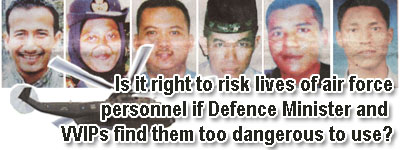
The country grieves with the families of the six crew members of the S61-A4 Sikorsky Nuri helicopter who perished in a crash in Genting Sempah on Friday, which resulted in a massive five-day search operation involving about 1,600 search and rescue personnel.
The casualties were: Capt Nor Azlan Termuzi, 29, from Kuala Lumpur; co-pilot Capt Nor Intan Asykeen Mohd Arof, 27, from Butterworth; air quartermaster Flight Sergeant Khusnizam Ariffin, 34, from Kelantan; avionics technician Flight Sergeant Mohamad Azmie Md Yassin, 35, from Batu Berendam, Malacca; airframe technician Leading Aircraftsman Saifulizam Alias, 28, from Muar, Johor; and engine technician Leading Aircraftsman Muhammad Ridzuan Ahmad, 27, from Pokok Sena, Kedah.
The latest Nuri helicopter crash — the 17th in 40 years and claiming 72 lives – has again raised questions about the safety and airworthiness of the Nuri helicopters.
It is most heart-rending to read of the account of Hashidee Murshin Hassim, 29, a childhood friend of Captain Nor Azlan Termuzi, of how the pilot in the fatal crash had a “fear of flying Nuri”.
Azlan, who had been a pilot for 11 years, had been flying the Nuri on the Sungai Besi-Kuantan route for the past two years.
The New Straits Times in its report “Captain feared flying Nuri” quoted Hashidee as saying that Azlan had told him that “he would rather drive a truck to Kuantan, because he felt safer”.
According to the NST report:
For each flight, Hashidee said, Azlan would always rely on the assurances given to him by the helicopter technician.
“He was even thinking of quitting the force, but his contract with them was the only thing that stopped him as he would have to fork out RM49,000 for breaching it,” he said.
“Everytime he flew the Nuri he would call to tell me that he was taking off and upon reaching Kuantan, he would call me again.
“This time, he never called me back.”
It is a very serious reflection of the shocking state of morale in the air force when Nuri pilots are living in literal fear of flying the helicopter. Continue reading “Nuri helicopters – is it right to risk lives of air force personnel if Defence Minister and VVIPs find them too dangerous to use?”
